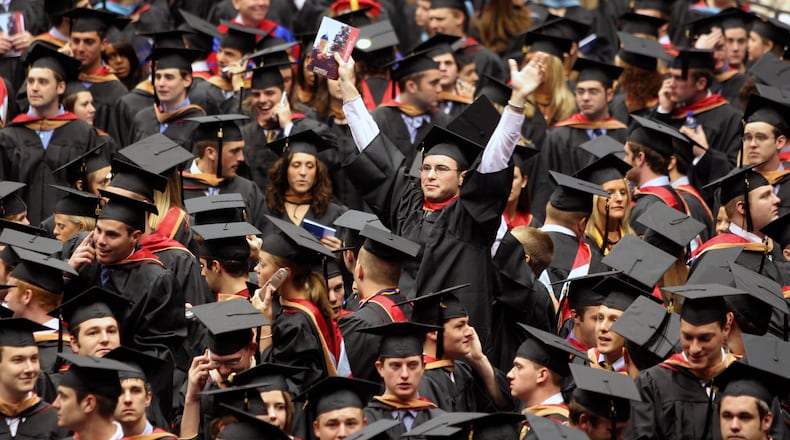For the first time, a majority of Republicans surveyed said higher education is having a negative impact on the country as a whole, according to the annual poll. Pew surveyed 2,504 adults for the poll in June and released the results earlier this month.
INITIAL REPORT: Are colleges hurting the U.S.? Majority of Republicans think so
Pew found that 58 percent of GOP voters believe that colleges negatively impact the U.S., up 13 percent from 2016. In contrast, around 72 percent of Democrats surveyed said higher education has a positive impact on the country.
The idea that more education has somehow hurt America is a concept born out of a “lack of information,” Ohio State University president Michael Drake told the Dayton Daily News. Drake said he would like to “spend some time with those 58 percent of people” to get to the root of their grievances.
Every person in the U.S. has benefited in some way by advancements in technology that colleges and universities helped shape, Drake said.
“We are not the country that we are without higher education,” Drake said. “The idea that it’s had a bad effect, that its not positive for the country…That’s not compatible with reality.”
The shift among conservatives didn’t come as a surprise to state Rep. Niraj Antani, R-Miami Twp., who serves as vice chairman of the higher education and workforce development committee. While Antani agrees that higher education is a necessity, he said perceptions in his party started souring around the time of the 2016 presidential election.
RELATED: Presidential pay: Who are Ohio’s highest paid college presidents?
To help students cope with the outcome of the 2016 presidential election, several area schools offered counseling sessions and “safe spaces,” something Antani criticized. He also said that it’s become apparent that some four-year universities are opposed to allowing a “diversity of thought” because they’ve canceled visits from conservative speakers.
“I think that’s very concerning,” Antani said. “Republicans view four-year universities as hostile to our culture, to our lifestyle.”
Last week, U.S. Rep. Jim Jordan, R-Urbana, also said he’s become concerned about incidents on campuses where controversial speakers have been canceled because of protests that have sometimes become violent. In November, for example, a former Breitbart editor speaking at the University of Wisconsin was heckled and protested so much that he couldn’t speak.
'Far less of that ivory tower '
Higher education leaders admit that’s not the campus narrative they want to portray and neither is the idea that a degree is too costly or too inaccessible.
That’s why there’s be a shift lately in what college administrators promote and boast about, said Sean Creighton, president of the Southwestern Ohio Council of Higher Education.
RELATED: Could your student loan be voided? What’s really going on
“More and more institutions are far less of that ivory tower,” Creighton said. “Higher education needs to do a better job of telling the counter story…of the positive impact it has on the lives of individuals.”
Schools such as Ohio State, Miami University and the University of Dayton have tried to change the affordability story-line by vigorously promoting tuition guarantee programs as a solution to soaring costs. Both Wright State University and UD have launched transfer partnerships with community colleges, making four-year degrees cheaper and accessible to more students.
Navigating around the negative narratives is tricky but necessary, said Janice Supplee, Cedarville University vice president of marketing and communications.
“Colleges and universities no longer have the luxury of saying ‘hey come for the great experience,’” Supplee said. “I think that’s how colleges have had to change their marketing.”
Cedarville, among other schools, has begun focusing more on career results than they used to in order to prove the positive impact of a college degree, Supplee said. Several universities have begun to promote their partnerships with businesses as to connect students with jobs once they graduate.
Just this month, Miami president Greg Crawford told congress that”traditional higher education” is no longer sufficient. In testimony to the House of Representatives’ Small Business Committee, Crawford called on colleges to reduce the negatives that have plagued them in the past while engaging more with businesses to produce better educational career outcomes for students.
“I know that relationship-building is key to (Miami’s) success,” Crawford said. “By this definition, my role as president of Miami University is entrepreneurial, especially in these days with so many pressures to enhance quality and reduce costs.”
By the numbers
A survey out this month by Pew Research Center showed for the first time that a majority of Republicans have a negative opinion of higher education’s impact in society.
58 percent of Republicans surveyed said they think colleges have a negative impact on the U.S.
45 percent of Republicans had a negative opinion of higher education just one year ago.
72 percent of Democrats have a positive view of higher educations impact in the country.
14 public universities in Ohio
23 community colleges are located in Ohio
About the Author
